Related Research Articles
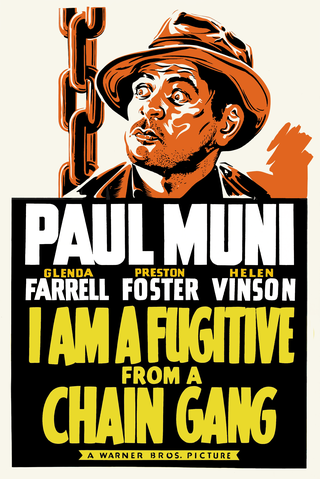
I Am a Fugitive from a Chain Gang is a 1932 American pre-Code crime-drama film directed by Mervyn LeRoy and starring Paul Muni as a wrongfully convicted man on a chain gang who escapes to Chicago. It was released on November 10, 1932. The film received positive reviews and three Academy Award nominations.

The Cool World is a 1963 feature film directed by Shirley Clarke about African-American life in the Royal Pythons, a youth gang in Harlem. In 1994, the film was selected for preservation in the United States National Film Registry by the Library of Congress as being "culturally, historically, or aesthetically significant".

The Living Desert is a 1953 American nature documentary film that shows the everyday lives of the animals of the desert of the Southwestern United States. The film was written by James Algar, Winston Hibler, Jack Moffitt (uncredited) and Ted Sears. It was directed by Algar, with Hibler as the narrator and was filmed in Tucson, Arizona. The film won the 1953 Oscar for Best Documentary.

Blackboard Jungle is a 1955 American social drama film about an English teacher in an interracial inner-city school, based on the 1954 novel The Blackboard Jungle by Evan Hunter and adapted for the screen and directed by Richard Brooks. It is remembered for its innovative use of rock and roll in its soundtrack, for casting grown adults as high school teens, and for the unique breakout role of a black cast member, film icon Sidney Poitier, as a rebellious yet musically talented student.
Precious Images is a 1986 short film directed by Chuck Workman. It features approximately 470 half-second-long splices of movie moments through the history of American film. Some of the clips are organized by genre and set to appropriate music; musicals, for example, are accompanied by the title song from Singin' in the Rain. Films featured range chronologically from The Great Train Robbery (1903) to Rocky IV (1985), and range in subject from light comedies to dramas and horror films.
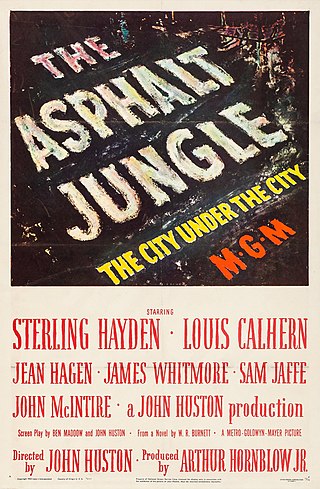
The Asphalt Jungle is a 1950 American film noir heist film directed by John Huston. Based on the 1949 novel of the same name by W. R. Burnett, it tells the story of a jewel robbery in a Midwestern city. The film stars Sterling Hayden and Louis Calhern, and features Jean Hagen, James Whitmore, Sam Jaffe, and John McIntire. Marilyn Monroe also appears in one of her earliest roles, as does Teresa Celli.

Pups Is Pups is a two-reel comedy short subject, part of the Our Gang series. It was produced and directed by Robert F. McGowan for Hal Roach, and originally released to theatres by M-G-M in 1930. It was the 100th Our Gang short that was released and the first in the 1930–1931 season.

The National Recording Registry is a list of sound recordings that "are culturally, historically, or aesthetically significant, and/or inform or reflect life in the United States." The registry was established by the National Recording Preservation Act of 2000, which created the National Recording Preservation Board, whose members are appointed by the Librarian of Congress. The recordings preserved in the United States National Recording Registry form a registry of recordings selected yearly by the National Recording Preservation Board for preservation in the Library of Congress.

Daughter of Shanghai is a 1937 American crime film directed by Robert Florey and starring Anna May Wong, Charles Bickford and Buster Crabbe. Unusually for the time, East Asian American actors played the lead roles. It was also one of the first films in which Anthony Quinn appeared. In 2006, Daughter of Shanghai was included in the annual selection of 25 motion pictures to be added to the National Film Registry of the Library of Congress.

(Sir) Charlie Chaplin (KBE) (1889–1977) was an English-born internationally renowned Academy Award-winning actor, comedian, filmmaker and composer who was best known for his career in Hollywood motion pictures from 1914 until 1952; he subsequently appeared in two films in his native England. During his early years in the era of silent film, he rose to prominence as a worldwide cinematic idol renowned for his tramp persona. In the 1910s and 1920s, he was considered the most famous person on the planet.

White Heat is a 1949 American film noir directed by Raoul Walsh and starring James Cagney, Virginia Mayo and Edmond O'Brien.
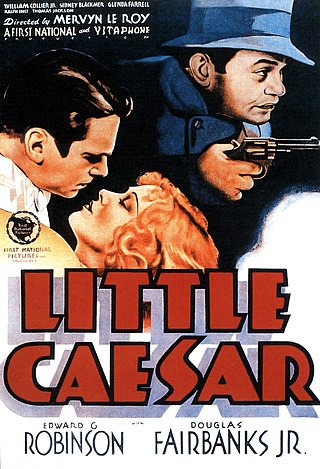
Little Caesar is a 1931 American pre-Code crime film distributed by Warner Brothers, directed by Mervyn LeRoy, and starring Edward G. Robinson, Glenda Farrell, and Douglas Fairbanks Jr. The film tells the story of a hoodlum who ascends the ranks of organized crime until he reaches its upper echelons. The storyline, based on real life Mafia boss Salvatore Maranzano, was adapted from the novel of the same name by William R. Burnett. Little Caesar was Robinson's breakthrough role and immediately made him a major film star. The film is often listed as one of the first fully-fledged gangster films and continues to be well received by critics.

The National Film Registry (NFR) is the United States National Film Preservation Board's (NFPB) collection of films selected for preservation, each selected for its historical, cultural, and aesthetic contributions since the NFPB's inception in 1988.
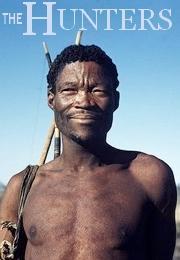
The Hunters is a 1957 ethnographic film that documents the efforts of four !Kung men to hunt a giraffe in the Kalahari Desert of Namibia. The footage was shot by John Marshall during a Smithsonian-Harvard Peabody sponsored expedition in 1952–53. In addition to the giraffe hunt, the film shows other aspects of !Kung life at that time, including family relationships, socializing and storytelling, and the hard work of gathering plant foods and hunting for small game.
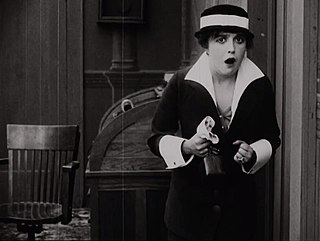
Mabel's Blunder (1914) is a silent comedy film directed by, written by, and starring Mabel Normand, the most successful of the early silent screen comediennes.

Heroes All is a 1920 American World War I documentary film that was released by the American Red Cross.
A Study in Reds (1932) is a polished amateur film by Miriam Bennett which spoofs women's clubs and the Soviet menace in the 1930s. While listening to a tedious lecture on the Soviet threat, Wisconsin Dells’ Tuesday Club members fall asleep and find themselves laboring in an all-women collective in Russia under the unflinching eye of the Soviet special police.
Hot Dogs for Gauguin (1972) is a short film written and directed by Martin Brest, then a film student at New York University. The short film features Danny DeVito and Rhea Perlman in her acting debut.

Dennis Hopper was an American actor, director, writer, film editor, photographer and artist. He made his first television appearance in 1955, and appeared in two films featuring James Dean, Rebel Without a Cause (1955) and Giant (1956). Over the next ten years, Hopper appeared frequently on television in guest roles, and by the end of the 1960s had played supporting roles in several films.
Crisis: Behind a Presidential Commitment is a 1963 direct cinema documentary film directed by Robert Drew. The film centers on the University of Alabama's "Stand in the Schoolhouse Door" integration crisis of June 1963. Drew and the other filmmakers, including D. A. Pennebaker and Richard Leacock, were given expanded access to key areas, including United States President John F. Kennedy's Oval Office and the homes of United States Attorney General Robert F. Kennedy and Governor George Wallace of Alabama. The film first aired on the American Broadcasting Company (ABC) as an installment of Close-Up! four months after the incident, on October 28, 1963. It was added to the National Film Registry of the Library of Congress on December 28, 2011.
References
- ↑ MUBI
- ↑ The Jungle / Several Friends / The Pocketbook / Grey Area|UCLA Film & Television Archive
- ↑ "Thriller and 24 Other Films Named to National Film Registry", Associated Press via Yahoo News (December 30, 2009)
- ↑ Library of Congress press release on films named to National Film Registry in December 2009
- ↑ "Complete National Film Registry Listing". Library of Congress. Retrieved 2020-11-17.